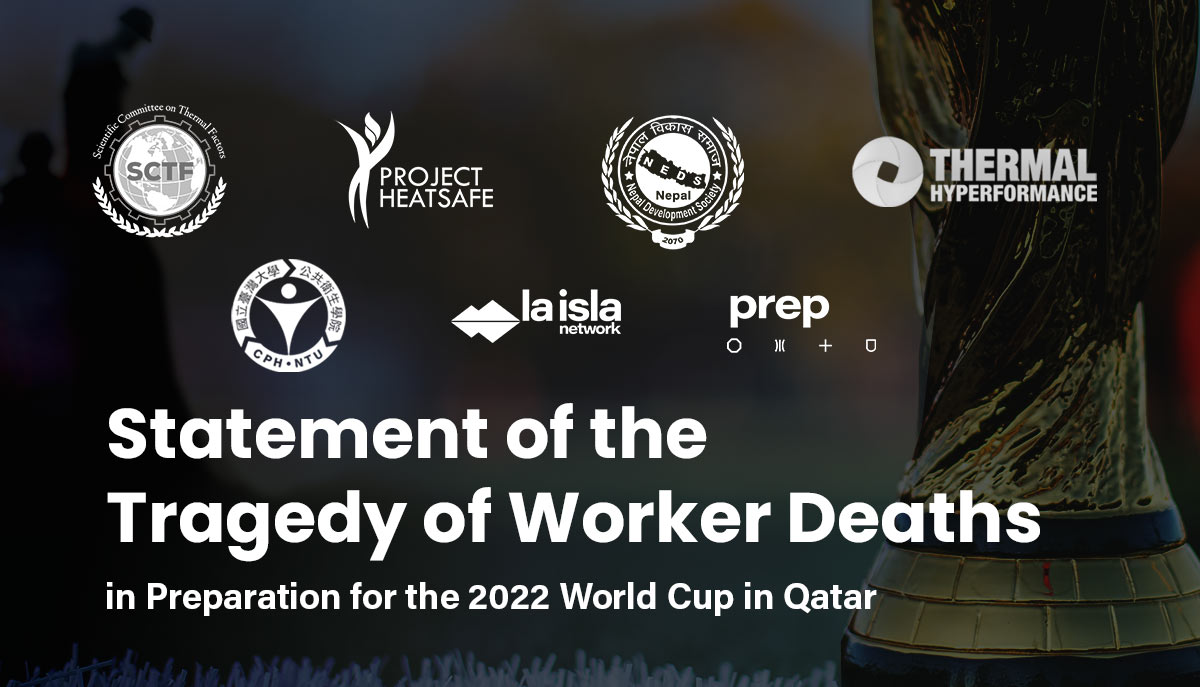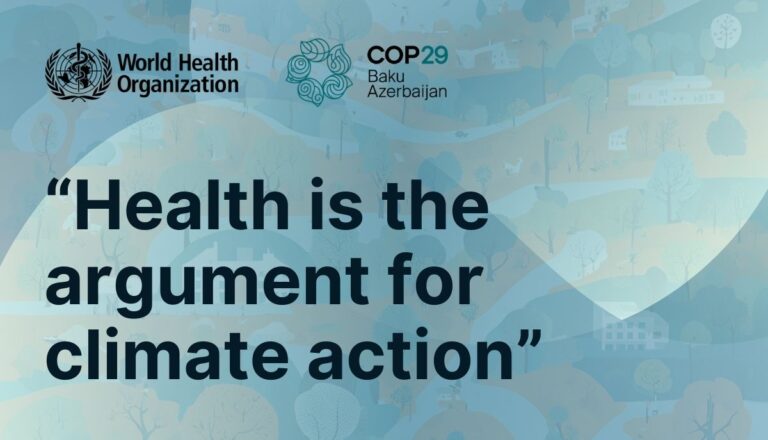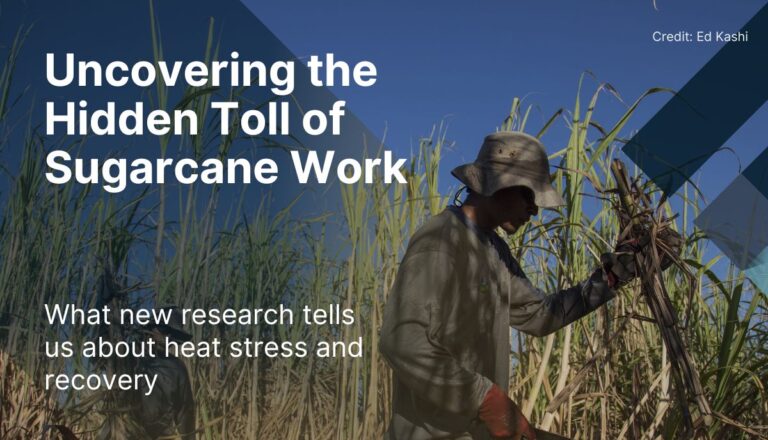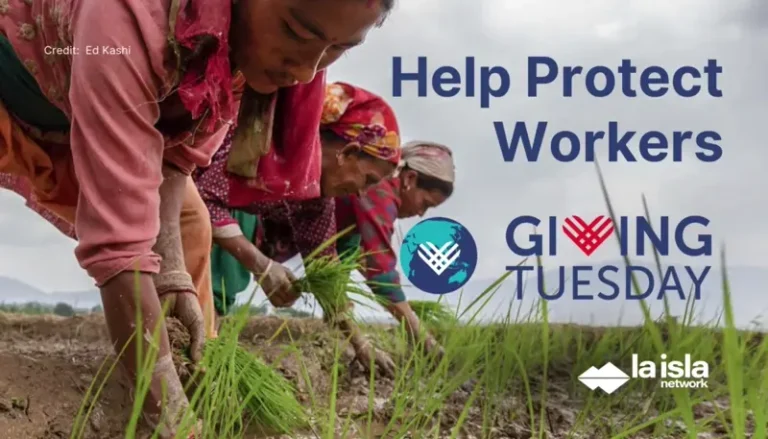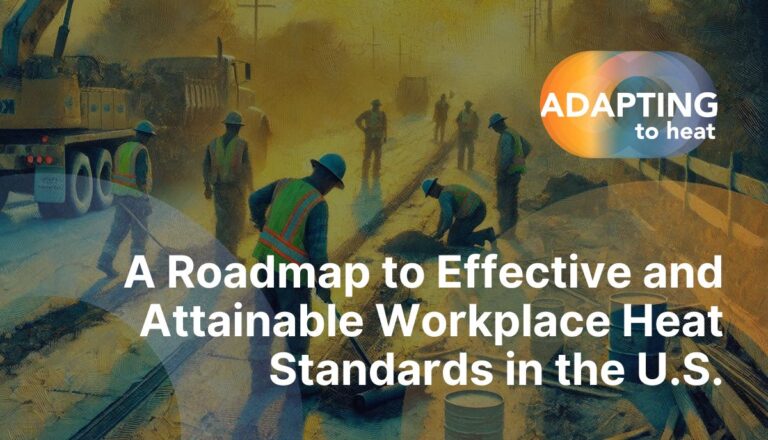Date: May 2022
Contact: Evan Watson (English), Head of Development & Engagement, La Isla Network. Quotes and comments are available from any of La Isla Network’s research and senior management team.
Email: ev**@la***********.org
Keywords: Human Rights, Workers’ Rights, Climate Change, Heat Stress, World Cup, Occupational Health, Migrant Labor
Statement of the Tragedy of Worker Deaths in Preparation for the 2022 World Cup in Qatar
The international occupational health and human rights organization La Isla Network has released a statement decrying structural inaction and systemic failures in protecting thousands of workers who suffered and died in Qatar ahead of World Cup, 2022. More than 30 leaders in climate, health, labor, and human rights research and advocacy have signed on expressing their support, including SCTF, Project Heatsafe, NEDS Nepal, Thermal Hyperperformance and the National Taiwan University.
Over 6500 workers have died, and thousands more have been injured (many due to heat stress) in the last decade since Qatar World Cup 2022 was announced. Additionally, there are growing alarming reports of migrant workers returning to their home countries with chronic kidney disease of nontraditional causes (CDKnt), a debilitating, often fatal disease resulting in kidney death.
CKDnt is driven by repeated exposure to extreme temperatures and strenuous labor without adequate rest, water, and shade protections. It is of epidemic proportion among manual laborers at the base of some of the most profitable industries on earth, specifically those who labor outdoors and are exposed to ever-warming temperatures. As a result, CKDnt may represent one of the first epidemics due to climate change.
What Led to the Crisis?
The statement acknowledges three critical areas of failure that have contributed to the crisis in Qatar. First, there has been an unstated belief that workers are expendable and migrant workers are easily replaced. This sentiment is evident in the fact that, while organizers have worked tirelessly to allay concerns about heat by air-conditioning their outdoor stadiums for spectators and athletes, no one in charge appears to have considered the human cost of constructing these air-conditioned sites in such a hot environment – over a 10-year period – all for a four-week event that doubtlessly will generate sufficient profit to have protected the lives that enabled it.
Second, there has been a persistent and naïve belief that by establishing rules and regulations on paper, a safe and appropriate work environment was provided. Regulations meant to protect workers from heat stress were only implemented recently, and there has been little evidence that the new regulations have addressed the problems faced by migrant workers.
Lastly, institutions failed in their due diligence and in taking expedient data-driven action. Whether due to willful ignorance of the risks inherent when people are exposed to heavy work in extreme temperatures, or corruption, the outcome has been the same for too many migrant workers and their families. Crucially, many academic researchers and practitioners of occupational health also fell short of their responsibilities and ideals by sitting on the sidelines as these issues ground on for a decade.
What Can be Done?
Apparent attempts at remediation are inadequate at best and often venal, including offering workers discounted tickets to World Cup games after years of abuse. In the face of such neglect, and with a mindfulness towards the risk of heat stress and other wholly preventable occupational risks related to climate change that will continue to affect workers throughout Qatar and the Gulf States beyond World Cup 2022, the statement concludes with targeted suggestions for those preparing for similar events or just engaged in further development efforts.
- Researchers and health protection authorities must align efforts on research and create interventions led by the precautionary principle in coordination with unions, worker defense organizations, and employers;
- The International Labor Organization (ILO), relevant United Nations institutions and the International College of Occupational Hygienists (ICOH) should work together to set up committees ahead of such major events that ensure migrant and worker human rights and occupational safety and health are protected;
- Construction companies should resource leaders in the OSH field to improve the assessment of risk, addressing those risks via effective policies and interventions;
- Brands that provide the financial fuel that drives FIFA and other events should reserve their advertising dollars and other financial incentives until they are assured of worker and migrant safety before and during future World Cup and other similar events. This is a modest ask of due diligence;
- Migrant home countries should not allow their population to be put at risk by avoiding offending host governments that rely on their citizens;
- Host Governments should develop open, publicly accessible data collection systems and data-driven regulations and enforcement systems that allocate resources effectively to improve worker safety;
- Development and charitable organizations should take advantage of experts to inform themselves about the risks to workers and others in a warming world and when crises are likely to emerge. Resources and funding should support preventative mechanisms so that after-the-fact expensive treatments and remediation are not the only focus;
- FIFA and football players have worked together with leading sports physiologists to ensure rest and hydration breaks per the steps taken during the World Cup in Brazil. Future World Cups should include guarantees for similar protections for the workers that make the games possible;
- Insurance companies should include provisos in coverage for liability claims related to worker injury, illness or death that preclude coverage from being provided to firms that do not take basic steps to protect workers in high-risk environments.
Given the lack of concern for migrants FIFA has shown in Qatar and dubious remarks by FIFA leadership that the migrant crisis in the EU may be ameliorated by having World Cups every two years and hosting more World Cups in Africa, these proposed steps carry fresh urgency.

